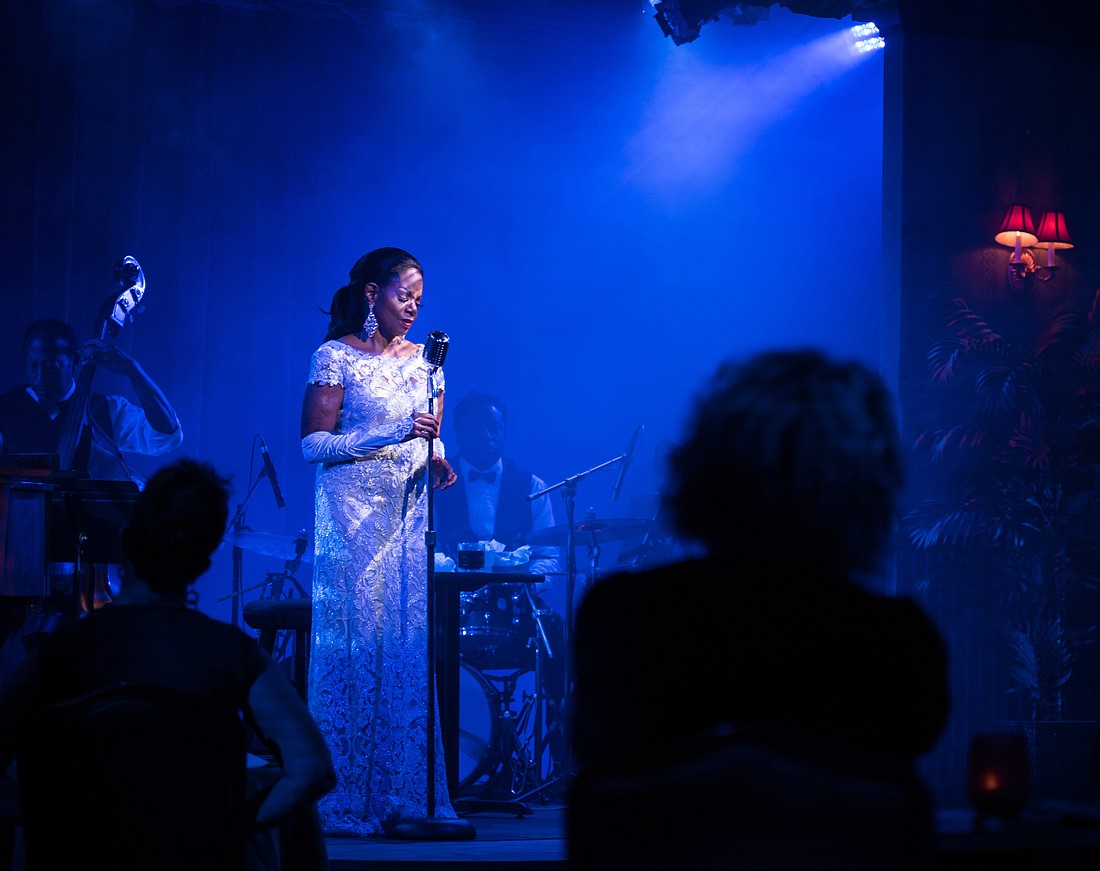- April 25, 2024
-
-
Loading

Loading

Billie Holiday was a paradoxical powerhouse. You could say the same about Lanie Robertson’s 1986 “Lady Day at Emerson’s Bar & Grill.” This slice of Holiday’s bittersweet life and music is the latest Westcoast Black Theatre Troupe production. Logically speaking, the play is like a bumblebee in flight. It shouldn’t get off the ground. But it does. Beautifully.
Robertson’s play tries to be two things at once. It’s a revue of Billie Holiday’s top songs. It’s also a night in the life of Billie Holiday — the night of her last concert. Her performance is an excuse to tell her life story. Holiday does, in a series of drunken and drugged rambling digressions that interrupt her songs.
You’d think the story of Holiday’s life would get in the way of the music. Either that, or the songs would block her biography. That’s exactly what happens here. Songs and story fight each other. Paradoxically, they both get stronger.
This contradictory experience unfolds in a fantastic, gritty performance by Melba Moore of Broadway fame. Moore not only sings; she sings in character. It’s the character of a fallen angel. As everybody already knows before the play starts. And there’s the danger.
Holiday’s tragic life story is easily sentimentalized. That doesn’t happen here. The playwright’s achievement is not so easy.
Robertson wrote this play before VH-1’s “Behind the Music,” but the template was already familiar: Despite their creative promise, Lenny Bruce or Hendrix or Janis or Elvis or [Artist Name Here] lived tragically short lives, cut down in their prime by the evils of booze or drugs. This instructional tale usually takes the form of the Icarus myth. The rise comes first. Then you see the fall.
In Robertson’s play, the fall is already in progress — and nearly over. You know how Holiday’s story ends. The playwright doesn’t tease you with lost possibilities or insert a public service message against substance abuse.
What you do get is a compassionate character study and an honest account of Holiday’s life. The soundtrack fills your ears with astonishing music. (Given voice by an astonishing singer.) You’ll hear some great songs, but not in the way you’re used to hearing them.
Yet again, the playwright takes you to an unfamiliar territory. You’re expecting fan service. An evening of Billie Holiday’s greatest hits. A lighted candle to her iconic songs like “God Bless the Child” and “Strange Fruit.” But Robertson makes a gutsy choice. She separates the songs from the singer. She gives you a sense of Holiday’s point of view and how she felt about the constant requests for her top two golden oldies. Although they weren’t exactly requests. (Billie was contractually obligated to perform those songs at every concert.) She’s sick of that !@#$.
Sick of “Strange Fruit”…?
Shocking! Disrespectful!
Maybe. But that’s how the burned-out Holiday must have actually felt at the end of her career, singing her heart out in a command performance to unappreciative squares in a dive in Philadelphia.
And when Moore actually starts singing Holiday’s mournful anthems, she puts her heart and soul into it. It’s a once in-a-lifetime performance by a Broadway legend.
That said, Moore’s aptly backed up by some legendary local talent. Her heartbreaking tribute to “Lady Day” comes together, thanks to a great band (pianist Levi Barcourt, drummer James Varnado, and guitarist Kenny Walker), Michael Newtown-Brown’s excellent set design, Patricia Gregory’s otherworldly costumes, and the clarity of Nate Jacobs’ unsentimental direction.
It all adds up to a worthy homage to Billie Holiday, not a superficial imitation. You might think you knew Holiday before seeing this play.
After seeing it, you’ll know you really didn’t.